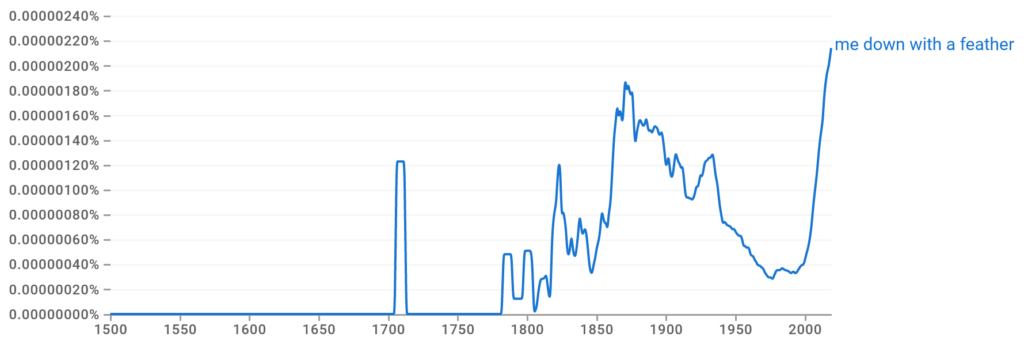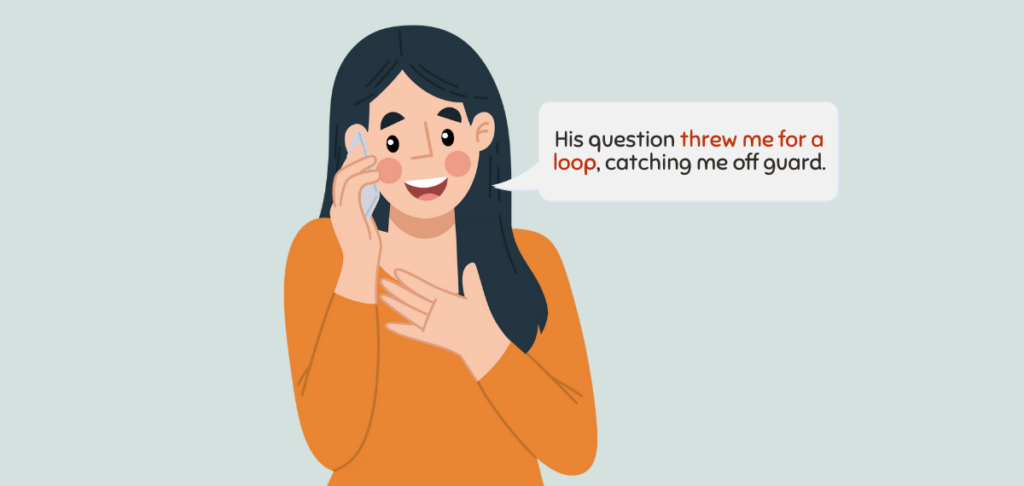Knock me down with a feather means being extremely surprised or astonished. It’s kind of like saying you’re so shocked that you could be toppled over by something as light as a feather.
Idioms, like knock me down with a feather, are phrases where the words together have a different meaning than their individual definitions. They play a crucial role in the English language by serving as cultural touchstones and facilitating communication with creativity and flair. Like all idioms, they possess the unique ability to transcend linguistic barriers and offer enjoyable, relatable avenues for expression.
In this article, I’ll get into this idiom’s origin, literal and figurative meanings, variations, and everyday uses. I’ll also provide tips for using it effectively and some related terms and phrases. Prepare to be knocked down by my overview of this common phrase!

What Does the Idiom Knock Me Down with a Feather Mean?
The idiom knock me down with a feather means to be extremely surprised or shocked by something that seems unlikely or unbelievable.
Merriam-Webster says the idiom is “used to say that one was extremely surprised or astonished when he or she found out about something.” Along similar lines, the Cambridge Dictionary and Collins Dictionary explain that it is “said to mean that you were extremely surprised or shocked by something.”
We tend to use it to convey a high level of surprise or disbelief, almost as if a light breeze could knock the speaker over due to their astonished state. The phrase usually appears in conversations where unexpected news or events have taken someone aback.
I can’t count how many times in my life someone could have knocked me down with a feather.
- When I published my first book, and it passed all my expectations in sales. (I did so with zero knowledge or experience in what I was doing.)
- When I found out I was pregnant. (unplanned but wanted!)
- During the pandemic when I lost not one but three close family members. (On the grim side, I know, but they were younger than me, so it was very surprising news.)
- When my six-year-old daughter begged for a piano, having never played one in her life, and proceeded to play Beethoven’s Fleur Elise by ear within minutes of getting one.
The list goes on and on, but you get the idea. Saying knock me down with a feather is reserved for times just like these.
Literal Meaning vs. Figurative Meaning
The literal meaning of knock me down with a feather would imply being physically knocked down by a feather, an impossibility since a feather is practically weightless. But that idea is what gives this idiom its impact. Figuratively, it highlights the speaker’s shock, emphasizing how even the slightest thing could overwhelm them in their surprised state.
Variations of the Idiom
As you travel around the world or branch out to meet new people online, you’ll always come across variations of certain phrases. Regional preferences and cultural traditions sometimes alter the way expressions are worded because the meanings of specific terms differ from country to country or even from century to century. Here are a few different forms of this phrase to consider.
- Knock me over with a feather
- Blow me down with a feather
- Knock down by a feather
How Is Knock Me Down with a Feather Commonly Used in Context?
The idiom knock me down with a feather is a remarkable addition to spoken and written English, often employed to express surprise or astonishment. Its various usages bring color and emphasis to communication, contributing to more engaging interactions.
In the following sections, we’ll explore the diverse ways this idiom can be utilized, share valuable tips to employ it effectively and guide you toward where you can find practical examples. By understanding these facets, you’ll gain a deeper appreciation for the idiom, amplifying your expressive capability with this vivid phrase.
What Are the Different Ways to Use Knock Me Down with a Feather?
- Personal stories: “When I heard the news that Octavia was moving across the country, you could have knocked me down with a feather!”
- In reaction to surprising news: “If someone had told me I’d win the lottery, I’d have said, ‘You could knock me over with a feather!'”
- In books or movies to show characters’ reactions to unexpected events. “Well, blow me down with a feather. Is that a real unicorn?”
What Are Some Tips for Using Knock Me Down with a Feather Effectively?
- You can use it to emphasize a dramatic reaction to any sort of surprising or unexpected news.
- It’s best used in informal contexts because it adds a touch of humor and exaggeration.
- Pair it with descriptive body language or facial expressions for added effect.
Where Can You Find Examples of Knock Me Down with a Feather?
You can find this idiom used in literature, movies, and television shows, especially in scenes where characters react to surprising or shocking revelations. It’s also used in casual conversations and storytelling.
There are tons of songs titled “Knock Me Down with a Feather” by artists like Easy October, Henry Cooper, and the Blockheads, just to name a few.
News outlets have been quoting the idiom for years, too, like in these examples:
As for those lockdown-lifting measures from Boris that pious Sturgeon used for maximum media impact, including a farcical suggestion from her party to introduce a police border between Scotland and England—knock me down with a feather!—she’s only gone and followed suit a week later. (The Sun)
“You could knock me over with a feather,” Pulis has since said about his former player’s transformation. (Forbes)
What Is the Origin of the Idiom Knock Me Down with a Feather?

The idiom knock me down with a feather originated sometime in the 18th century and was used to articulate extreme surprise in a humorous and exaggerated way.
One of the first uses of it in print can be found in Rural Rides by William Cobbett back in 1821, where he wrote, “You might have knocked me down with a feather.”
How Did the Idiom Evolve Over Time?
The idiom has maintained its core essence of expressing surprise over time, but its application has become more widespread and diverse. Starting as an exaggerated and humorous way to signify shock in the 18th century, it has evolved to be used in more casual and less dramatic contexts in contemporary conversation.
Nowadays, it’s often employed in daily dialogue to emphasize a sense of astonishment or disbelief. This evolution reflects the dynamic nature of language, adapting to changing societal norms and communication styles.
What Are Some Related Terms to Knock Me Down with a Feather?
The phrase is kind of old-fashioned and doesn’t really work in serious situations. So, if you need another way to express the idea of being utterly shocked, here are a few alternatives.

Synonyms
- Flabbergasted
- Astonished
- Dumbfounded
- Amazed
- Thrown for a loop
- Speechless
- Astounded
- Stunned
Antonyms
- Unsurprised
- Unimpressed
- Expectant
Knock Me Down with a Feather: Test Your Knowledge!
Choose the correct answer.
What Have We Learned about Knock Me Down with a Feather?
This idiom knock me down with a feather is a carefree way of expressing surprise and amazement in a playful and exaggerated manner. Its origin in the 18th century and its evolution over time show the dynamic nature of idiomatic expressions.
We covered everything about its meaning, origin, variations, and even how it can be used in everyday situations. Do you feel more confident using it now? I hope so! If you want to learn more fun idioms like this one, I cover hundreds right here on the site, so spend some time checking them out!
Check out some others we covered:
